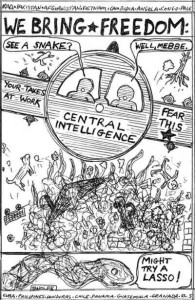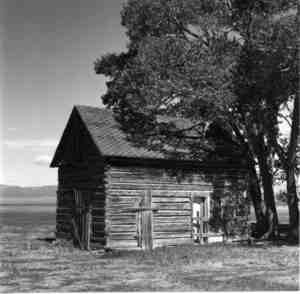Essay by Deric Pamp
Christo Project – March 2006 – Colorado Central Magazine
It was cold again this morning, the temperature at zero and a brisk wind ruffling the rabbit brush. I had made excuses to the dogs yesterday, explaining how cold it was and how they really would not be happy out there. Today they sat around me in a half circle as I drank coffee, clearly unwilling to brook any more nonsense about cold from one who wore shoes and could insulate the rest of his pelt. So I wrapped up, put on my favorite old knit wool hat, and took the dogs out to the truck. Their joy was loud, energetic and complete. As we skidded down the driveway, they were already barking at a horse, three fields over and half a mile away.
We crossed the river, then stopped next to the fence by the fish hatchery. Two senators from distant states were so proud of spending our money to build the hatchery that they had named the appropriations bill after themselves, then made sure we’d all know about it by spending more of our money on a sign to put on the fence. We headed down the bike trail that runs along the river, while Sam- I- Am inspected carefully the calling card of a member of SAPIT, the Society of Animals that Poop in Trails. I wondered how often we would have this place to ourselves, after the new hospital is built, just across the road. Our valley is changing.
The river moved calmly and steadily toward distant places, carrying in its flat stretches a load of slushy drift ice that disappeared in the riffles and then reformed in the next smooth part. The boulders in mid- stream had skirts of snow and ice, longer on the downstream side, as if Christo had wrapped them, the way he did those islands in Biscayne Bay.
I am ambivalent about Christo’s request to spread cloth panels across several miles of the Arkansas River, down toward Spikebuck and Cotopaxi. I suppose it is art, although I don’t presume I am qualified to judge its artistic value. I had thought his wrapping the Reichstag was silly, but the umbrellas in Japan and the running fence in California were graceful, and the Gates in Central Park were an interesting artistic statement. Would “Over the River” be as interesting?
Most of the letters to the newspaper opposing the project and/or Christo himself give off strong whiffs of NIMBY (Not In My Back Yard) and were written by people who commute from Coaldale or Howard to Canon City. If I drove the gorge every day, would I still be intrigued by the project? Christo’s record of spending no money from government or corporate sponsorships, cleaning up nicely afterwards, recycling his materials, and hiring locally for the temporary jobs he creates, all speak well of him. The work will be ephemeral and the only lasting environmental “damage” will be a few holes drilled in rock walls, to anchor the cables. The problem is the delay and inconvenience caused first by construction and then, surely, the hordes of tourists who will come to see the project.
The flood of tourists will leave money in town, however, the way ice or driftwood hangs up on rocks in the river. Tourism is a major industry, perhaps the backbone of the local economy. Our neighbors who own or work in tourist businesses will benefit. They will have more money to spend on other businesses, like mine, that do not rely directly on tourists. Since the whole project will disappear in three or four months, leaving only memories, money, and a few drill holes, the ethical question is, how much inconvenience to local people who drive the gorge should their neighbors who benefit from tourist dollars expect them to bear? How ready should one person be to extend the time it takes to go to work or to the supermarket, so that his neighbor can earn a better living that year? How far should neighborliness go?
The state demographer recently spoke in downtown Salida, describing how second homes are an economic “driver” of the local economy and how a flood of Baby Boomers is on its way to our county — less immediate or intense than the wave of tourists who will come to see “Over the River” but much more lasting and widespread in effect. His point was that we need area- wide planning, from Poncha to Salida, Nathrop and Buena Vista, to deal with this influx over the next 30 years as the tsunami of population growth comes crashing into the Upper Arkansas Valley. We can see up in Breckinridge, Silverthorne, and Frisco the mess that will result if we don’t do the planning. He tiptoed around the political issues that go with such planning, which requires the use of zoning, planned unit development regulations, and other land use controls, but the fact is, we will surely have a mess if we don’t make some choices soon.
But here’s another question of neighborliness. Land use controls mean that some of our neighbors who own big tracts of land may be limited in the amount of money they can make from the land. The rest of us will benefit by not being so badly snarled in traffic or forced to look out on the maximum acreage of cracker- box McMansions, and keeping the rural atmosphere will preserve our own property values. Property rights may be less attractive than individual rights to free speech or equal protection of the law but they are real, and the big landowners will lose the most potential gain if the voters put in restrictions.
How much should one neighbor be asked to give up, in dollars in the bank or inconvenience or rural ambience, to provide benefits to another neighbor, of dollars in the bank or inconvenience or rural ambience? I understand that 300 landowners, who hold 60% of the land in Chaffee County, oppose tighter zoning controls and suggest that those who have “the largest stake” in the issue should decide it. Well, yes, but we all have a stake in the issue. Looser zoning means more houses, which means congested highways and replacing open fields with vistas of housing developments. Another recent presenter, down from Steamboat, had figures and surveys to show how important to the quality of life are the views of forests and open fields and the rural atmosphere we now have.
I know how I would vote on these issues, but I am not trying to tell you how to vote. Reasonable people can differ reasonably. I ask you to think not about traffic on the highway or dollars in the bank, but in terms of neighborliness. How good a neighbor are you? How ready are you to give up something of value to you so others can benefit? Me, I’d like to see my neighbors have a good year financially, I want to see “Over the River,” and I hope I’d say the same thing if I lived further down river and had to deal directly with the traffic nightmare — it won’t last forever and my neighbors need the tourist money. On the larger land use issues, I’d welcome some reasonable new controls, if they don’t hammer landowners’ expectations too harshly, because I know what it’s like to watch housing fill up once empty hillsides, more cars to clog the roads and change the nature of a community — and I want the good people of Chaffee County to have a chance to grow slowl
My dogs had a good walk and are scattered around the living room, sleeping soundly in sunny places. I look out the window toward Mt. Ouray and wonder what the view will be like, ten or twenty years from now.


